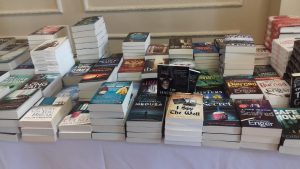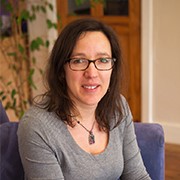
Sad to say, I could only attend the first two days this year, but what a fabulous event with incredibly talented people to meet, both participating authors and audience. These are some of my highlights/titbits of advice from the panel debates of Thurs/Fri reflecting the breadth of the genre and see my “Awards” at the bottom of the post:
On “To Plot or not?” Steph Broadribb (Deep Down Dead) covers the room with post-it notes of ideas, whilst Lucy V Hay (The Other Twin) detests the blank page and “vomits out” (her words not mine) the first draft as quickly as possible so she can move swiftly on to edit. CJ Box (Paradise Valley) is meticulous, planning every chapter before he writes his Wyoming-based stories.
On “secrets” moderator Valentina Giambanco (Sweet after Death) quoted Benjamin Franklin; “Three can keep a secret only if two are dead” and Andrea Carter’s (The Well of Ice) small town solicitor is both an outsider and “a keeper of secrets”.
“Who to trust?” In JS Monroe’s novel (Find Me) the main character is investigating the apparent suicide of his girlfriend but is suspicious that all is not what it seems. When writing he thinks of what really might have happened and then considers “how to present it differently.” Malin Persson Giolito’s novel (Quicksand) centres upon the trial of her protagonist, Maya. She “uses people’s preconceived ideas to mislead” and asks “are we all manipulators?” Felicia Yap (Yesterday) questions how to investigate a murder (and who to trust) in a place where no one can remember anything happening before yesterday.
In “The Ashes of Berlin” Luke McCallin examines through his German officer (just after WWII) what make it acceptable to behave “in an extreme way”; a theme also examined by Johana Gustawsson in her “Block 46”. In Doug Johnstone’s “Crash Land” the main characters don’t realise what is motivating them to do what they do and Doug maintains that, when under pressure, people will “often do something morally ambiguous.”
On “place” David Coubrough (Half a pound of Tuppeny Rice) has set his novel in Cornwall, where he has fond memories of childhood holidays. Whereas Julia Crouch (Her Husband’s Lover) uses the huge changes to the landscape and “social cleansing” of Elephant & Castle, where her novel is set, as a metaphor for her plotline of a woman desperately trying to erase her troubled past. Rod Reynolds (The Dark Inside) was keen to leave Texarkana (USA) the real city where his novel is set and Matt Wesolowski (Six Stories) describes his fictional Scarclaw Fell as part of a Northumberland “steeped in the blood” of past wars.
On “what is really scary?” Mary Torjussen (Gone Without a Trace) is most terrified by things that happen in your own home, like the creaking door late at night. Julia Crouch believes that “normal relationships are compelling” but also that “everyone has a take on something” and Lucy Dawson (Everything you Told Me) believes the home (and the family within it) may be the most dangerous place you can go.
On “tension” CJ Box likes to have several plots at the same time with only the reader getting to see each strand and Adam Hamdy (Pendulum), who cites Henry Hill’s (Goodfellas) challenge of shifting guns whilst, at the same time, trying to ensure the sauce for the meatballs doesn’t spoil, as a memorable moment of great cinematic tension. He says you “have to be prepared to sacrifice your characters on the altar of suspense.”
On “serial killers” Helen Fields (Perfect Prey) believes we have a “morbid curiosity” with this theme and says that in her experience (as a criminal barrister) sociopaths want to “draw other people in” to make them understand their reasons for carrying out their deeds. Leigh Russell (Deadly Alibi), who admits she abhors violence of any kind, prefers to imagine real serial killers “in America” rather than closer to home. Her view is that our fascination with serial killers may be “an adult version” of the overcoming monsters stories we read as children.
Best mixed metaphor: the herrings that left the flock (Malin Persson Giolito)
Best one liner: we are all one rizla paper away from chaos (Doug Johnstone)
Best research for a character: Steph Broadribb’s Florida bounty hunter training and drive across 6 US states
Most unusual setting: Botswana – for the latest Inspector Kubu story Dying to Live (Michael Stanley) involving body parts and witch doctors
Most intriguing idea: people whose memories only last one day (Felicia Yap – Yesterday)
Most interesting form of writing: Matt Wesolowski (Six Stories – use of podcast interviews to help solve a murder)
Funniest moment: I really wanted to write a father and son novel so I made the father the hitman and the son a journalist (Antii Tuomainen – The Man who Died)
